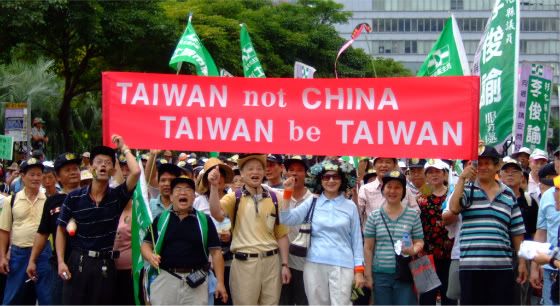Ernest Bower and Charles Freeman
Ernest Bower is the Senior Adviser & Director for Southeast Asia Studies at Centre of Strategic and International Studies (CSIS). Charles Freeman is the Freeman Chair of China Studies at CSIS.

Pro-independence activists objecting the One-China policy
Singapore’s policy toward Taiwan is an example of the tightrope that Southeast Asian countries need to walk in the new era of an increasingly powerful China asserting itself – particularly in relation to its “core interests” including Tibet, Taiwan and (the newest addition to the “core”) the South China Sea. Last week’s carefully-worded Chinese go-ahead for Singapore and Taiwan’s announcement that the two economies and fellow WTO members intended to explore a free trade agreement is an excellent example of the difficult balance Southeast Asians must struggle to maintain in the face of an increasingly muscular neighbor. But heavy-handedness by Beijing also bears its share of reputational risk for China, which has thrown its weight around a lot lately, thereby raising concerns among its neighbors.
Singapore’s Dilemma
On the one hand, Singapore is bound to promote its national security interests, a patchwork quilt knit together by a myriad of strategic threads, notably including proactive defense relationships built on interdependence, interoperability and strong relationships and sustaining high levels of trade and investment. Singapore is, by its own account, a very small country with a population of just over 4 million including expatriates and competing with Hong Kong[2] for the world’s most trade dependent economy. Trade accounts for more than 300 percent of Singapore’s gross domestic product. Trade is its life blood. In addition, defense and economic imperatives make Taiwan an important partner for Singapore.
On the other hand, Singapore is playing a careful hand with China – leading the way in helping its giant neighbor navigate its peaceful and constructive entry into the community of nations in Asia, particularly Southeast Asia. Singapore strives to help China and other major powers, including the United States and India, maintain balance by playing a useful intermediary role. Due to its closeness to China, Singapore is acutely aware of Beijing’s sensitivities – including those regarding Taiwan. For this reason, Singapore is in a unique position to negotiate with Taiwan on an FTA structure that China will feel more confident will not offend its sensitivities – or its “core interests.”
It follows that Singapore stands firm on its “one China policy” when it comes to Taiwan. However, Singapore’s deep engagement with Taiwan is also consistent with its national security policy.
Strong Singapore-Taiwan Defense Links
Singapore and Taiwan have deep historical ties on defense and security. Lacking space for large scale exercises and maneuvers, Singapore long relied on Taiwan’s support for annual joint training exercises, the cornerstone of bilateral military to military cooperation, called Operation Starlight. For over 30 years, beginning in 1975, Singapore trained troops in Taiwan under this program. At the peak of joint cooperation in the 1990’s, Singapore trained 15,000 troops in Taiwan. Although Sino-Singaporean military cooperation[3] has eclipsed that between Singapore and the “Republic of China Army” on Taiwan, those ties remain strong.
Trade as a Core Interest
On August 5, the Taipei Representative Office in Singapore and the Singapore Trade Office in Taipei announced they would “explore the feasibility of a bilateral economic cooperation agreement on a par with a free trade agreement (FTA).” They indicated that the agreement would be within the framework of the World Trade Organization (WTO) and that they planned to meet later this year to discuss the agreement. The response from Beijing, after inevitable consultation with Singaporean officials, was far from a ringing endorsement, but was at least a tepid thumbs-up. A Taiwan Affairs Office official in Beijing, addressing the issue, said: “we believe Singapore will adhere to the one-China policy, and properly handle its economic and trade relations with Taiwan accordingly.”
Taiwan, like Singapore has a trade dependent economy. Singapore is it is 6th largest trading partner. Taiwan is also concerned about sustaining its link to trade opening measures globally and particularly in Asia. From Taipei’s perspective, recent discussions of Asian regional trade and security architecture focusing on the East Asia Summit (EAS) model are unnerving. If focus shifts from the Asia Pacific Economic Cooperation (APEC) forum, a grouping of 21 “economies” including Taiwan toward EAS and the TransPacific Partnership (TPP) trade negotiations, Taiwan could be left out. Given that trade patterns in the wake of the global economic crisis are dynamic and shifting, being cut out of new preferential trade mechanisms could be devastating to the Taiwan economy.
Therefore, the free trade agreement with Singapore would anchor Taiwan in ASEAN. ASEAN is important strategically as well as practically (as a large market of 650 million people with a $1.4 trillion gross domestic product) because nearly all countries involved agree is the core of the new trade and security architecture in the region. Accordingly, Taiwan’s Ministry of Economic Affairs (MOEA) announced it is considering Vietnam and Indonesia as new potential free trade partners.
Will China Apply Pressure?
Singapore’s venerable President S.R. Nathan is kicking off an eight day visit to China this week. He is likely to hear firm and unyielding, though not completely insensitive, views on his country’s plans to move forward with Taiwan on trade. Given recent Southeast Asian reactions to China’s revealingly aggressive reactions to U.S. proposals to resolve South China Sea disputes on a multilateral basis using international law, China may decide to keep its watchful eye on Singapore and Taiwan’s trade negotiations hidden from public view. Rest assured Southeast Asian policy makers are watching this space closely, as the rights to trade and defend one’s country is fundamental to sovereignty. That China’s “core interests” on the question of Taiwan’s sovereignty may impact the rights of others to exercise their own sovereignty will continue to raise anxiety and well-founded concerns in Asia and elsewhere.
—
This article was published here.

